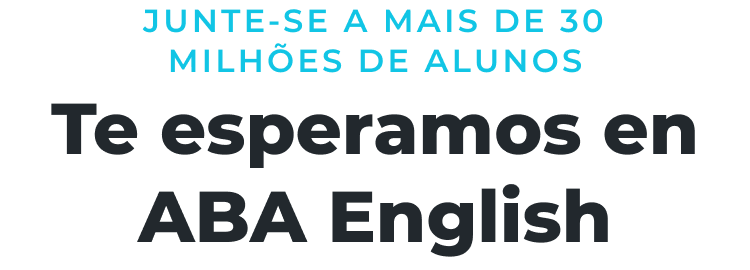Condicionais em inglês
O que são as condicionais em inglês e quando são usadas?
As condicionais são muito utilizadas em inglês, mesmo que possam não parecer tão comuns na nossa comunicação diária. Basicamente, uma condicional é uma estrutura gramatical que nos permite expressar algo que acontece com base no cumprimento, ou não, de uma condição.
Quantas condicionais existem em inglês? Há quatro tipos de condicionais em inglês e cada uma delas aborda algo que poderia acontecer (no presente ou futuro) ou que poderia ter ocorrido (no passado). Você já se arrependeu de alguma coisa? Neste caso, certamente usou uma condicional para expressar seu arrependimento.
Exemplos:
- If I had not lost my wallet, I would have all my documents. (Se eu não tivesse perdido minha carteira, eu teria todos os meus documentos.)
- If they had attended the course, they would have learnt how to paint. (Se eles tivessem assistido o curso, eles teriam aprendido a pintar.)
+30 MILHÕES DE ALUNOS
Junte-se à escola digital de inglês
mais grande do mundo e aprenda inglês
Tipos de condicional
Zero Conditional
A zero conditional é utilizada para falar sobre verdades gerais ou situações que são reais e possíveis.
Para construíla, é utilizada a seguinte estrutura:
If + sujeito + verbo no presente simples, sujeito + verbo no present simples
Como você pode ver, os verbos de ambas cláusulas estão no presente simples.
Exemplos:
- If you fall, you get hurt. (Se você cai, se machuca.)
- If you walk under the rain, you get wet. (Se você anda na chuva, se molha.)
First Conditional
A first conditional é usada para falar de uma condição possível e um resultado provável no futuro.
Para construí-la, a seguinte estrutura é utilizada:
If + sujeito + verbo no presente simples, sujeito + will/won’t + verbo no infinitivo
Neste caso, o verbo da cláusula de condição está no presente simples e o da cláusula de resposta está no futuro com will.
Exemplos:
- If they pay me for the project, I will buy a new car. (Se eles me pagam pelo projeto, eu comprarei um carro novo.)
- If they get some days off, they will visit us. (Se eles têm dias de folga, virão nos visitar.)
Second Conditional
A second conditional é usada quando há poucas probabilidades de que algo aconteça.
Para construí-la, a seguinte estrutura é usada:
If + sujeito + verbo no simple past, sujeito + would/wouldn’t + verbo no infinitivo
Neste caso, o verbo da cláusula de condição está no passado simples e a cláusula de resposta é escrita com o verbo modal would, seguido do verbo no infinitivo.
Exemplos:
- If he were more organized, he would give better outcomes. (Se ele fosse mais organizado, teria melhores resultados.)
- If they were rich, they would travel the world. (Se eles fossem ricos, viajariam pelo mundo).
Third Conditional
A third conditional é usada para falar sobre o passado em situações de arrependimento.
Para construí-la, é utilizada a estrutura a seguir:
If + sujeito + verbo no passado perfeito, sujeito + would/wouldn’t have + particípio passado do verbo
Neste caso, o verbo da cláusula de condição fica no passado perfeito e a cláusula de resposta é escrita com o modal would/wouldn’t have seguido pelo particípio passado do verbo.
Exemplos:
- If you had listened to me, you would have saved your tears. (Se você tivesse me escutado, teria poupado suas lágrimas.)
- She would have played better if she had trained every day. (Ela teria jogado melhor se tivesse treinado todos os dias.)
Já conhece seu
nível de inglês?
Comece o teste
Cadastre-se em nossa página e acesse o teste de nível gratuito. Em poucos minutos você conhecerá seu nível e poderá continuar progredindo no curso.

Exercícios das condicionais em inglês
Exercícios da zero conditional
Exercício da zero conditional na forma afirmativa
Complete as seguintes orações afirmativas na zero conditional.
- If Tony _______________ (wake up) at 7 a.m., he ________ (be) grumpy.
- If I ______________ (go) late to bed, I _________ (feel) terrible the next day.
- Anna ___________ (miss) her friend if she doesn’t _________ (see) her for a week.
Respostas:
- wakes up / is
- go / feel
- misses / see
Exercício da zero conditional na forma negativa
Forme orações negativas na zero conditional, usando os elementos abaixo.
- I / not call my mom / she / get upset.
- You / not drink soda / be healthy.
- She / clean the house / not do laundry.
Respostas:
- If I don’t call my mum, she gets upset.
- Don’t drink soda if you want to be healthy.
- If she cleans the house, she doesn’t do the laundry.
Exercício da zero conditional na forma interrogativa
Traduza as seguintes orações interrogativas para o inglês usando a zero conditional.
- Que horas você acorda se tem que ir para a universidade?
- O que você gosta de fazer se tem tempo livre?
- Para onde a Ana vai se ela tem que se exercitar?
Respostas:
- What hour do you wake up if you have to go to university?
- What do you like to do if you have free time?
- Where does Ana go if she has to exercise?
Exercícios da first conditional
Exercício da first conditional na forma afirmativa
Complete as seguintes orações afirmativas na first conditional.
- We ___________ (visit) Doha if we ___________ (travel) to Qatar.
- If you ___________ (give) your mom a present, she _________ (be) very happy.
- Mary ___________ (buy) a new house if she ___________ (get) a good job.
Respostas:
- will visit / travel
- give / will be
- will buy / gets
Exercício da first conditional na forma negativa
Traduza para o inglês as seguintes orações negativas usando a first conditional.
- Se você não estudar, não passará no exame.
- Alex não irá ao parque se a chuva não parar.
- Se John não se apressar, ele não pegará o avião.
Respostas:
- If you don’t study, you will not pass the exam.
- Alex won’ go to the park if the rain doesn’t stop.
- If John doesn’t hurry up, he will not catch the plane.
Exercício da first conditional na forma interrogativa
Complete as orações com a conjugação verbal adequada para criar orações interrogativas com a primeira condicional.
1. If I _________ (pay) for the tickets, ________ (go/you) with me to the concert?
2. __________ you (buy) her an ice cream if she__________ (win) the first place?
3. If John __________ (ask) you how to apply, __________you (help) him?
Respostas:
- paid / would you go
- Would you buy / won
- asked / would you
+30 MILHÕES DE ALUNOS
Junte-se à escola digital de inglês
mais grande do mundo e aprenda inglês
Exercícios da second conditional
Exercício da second conditional na forma afirmativa
Traduza para o inglês as seguintes orações afirmativas na segunda condicional.
- Se eu conseguisse o emprego, compraria um carro.
- Se você pagasse suas contas na hora, não teria problemas.
- Se eu tivesse mais tempo, iria à sua festa de aniversário.
- Se eles fossem mais legais, sorririam.
Respostas:
- If I got the job, I would buy a car.
- If you paid your bills in time, you wouldn’t have problems.
- If I had more time, I would come to your birthday party.
- If they were nicer, they would smile.
Exercício da second conditional na forma negativa
Conjugue os verbos entre parênteses para criar orações negativas na segunda condicional.
- We __________ (not got) to the concert, if we __________(not buy) the tickets,
- If you ___________ (not turn off) the TV, you ____________ (not missed) the interview.
- If Luke ____________ (not have) money, he __________ (not live) in a mansion.
- I ____________ (not buy) jewelry if I ____ (have) more money.
Respostas:
- won’t go / don’t buy
- don’t turn off / won’t miss
- didn’t have / wouldn’ live
- will not / have
Exercício da second conditional na forma interrogativa
Create second conditional interrogative sentences with the following elements.
- You look taller. You used big shoes
- Sue lives in Seattle. She took the ferry to work.
- We have a discount. We were at the restaurant
- I have a good job. I live in a mansion
Respostas:
- Would you look taller if you used big shoes?
- Would Sue take the ferry to work if she lived in Seattle?
- Would we have a discount if we were at the restaurant?
- Would I live in a mansion if I had a good job?
Exercícios da third conditional
Exercício da third conditional na forma afirmativa
Escolha a opção correta para formar orações na third conditional.
1. If we _________for the test, we could have passed.
- a. had studied
- b. have studied
- c. had study
2. She could ____________ if she had worked harder.
- a. has gone
- b. have gone
- c. had gone
3. If they __________ the news, they might have known.
- a. would have read
- b. have read
- c. had read
4. If I _____________ this was boring, I would have seen a different episode.
- a. had known
- b. could have known
- c. knew
Respostas:
- a
- b
- c
- a
Exercício da third conditional na forma negativa
Traduza as seguintes orações na terceira condicional para o português.
- If I had not practiced, I would not have passed the exam.
- Andy would not have gone to the match if she had not had the tickets.
- If they had not been ill, they would have gone to the cinema.
- If I had not come to Brooklyn, I would not have met you.
Respostas:
- Se eu não tivesse praticado, não teria passado no exame.
- Andy não teria ido ao jogo se ela não tivesse tido as entradas.
- Se eles não tivessem estado doentes, teriam ido ao cinema.
- Se eu não tivesse vindo ao Brooklyn, não teria te conhecido.
Exercício da third conditional na forma interrogativa
Reescreva as seguintes orações na terceira condicional interrogativa.
- You had known about the party. You told me.
- They had won the competition. They have bought something.
- I had known about her. I have stayed.
- He had caught the bus. He has called you.
Respostas:
- Would you have told me if you had known about the party?
- If they had won the competition, what would they have bought?
- If I had known about her, would I have stayed?
- Would he have called you if he had caught the bus?
Links úteis


























